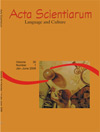<b>Diaspora conditions in The Match</b> - DOI: 10.4025/actascilangcult.v31i1.5277
Abstract
Romesh Gunesekera, a Sri Lankan born British writer, “a connoisseur of displacement” who has been “brought up on three separate islands – Sri Lanka, the Philippines and England” (IYER, 1995, p. 30) and a London resident since 1972, belongs to those “‘South Asian’ (diasporic) writers” (NASTA, 2000, p. 96), who seeks to write (concepts of) ‘home’ from a series of multiple locations (NASTA, 2002, p. 216). In all of his texts, Gunesekera’s primary concern is not to (re)create a particular place, or a real landscape, it is rather how to write the diasporic stories of individual lives based on personal and highly private fragments of memories. The Match (GUNESEKERA, 2006), Gunesekera’s latest novel, takes up some of the themes already elaborated upon in his prize-winning short story collection Monkfish Moon (GUNESEKERA, 1992), or in the Booker Prize Finalist (1995), Reef (GUNESEKERA, 1994), a short novel: Sri Lankans (in)voluntarily leaving their ‘home’, faced with the intricacies of setting up ‘home’ way from ‘home’, frequently idealizing the place they have left behind, nostalgically yearning to re-turn, re-access and re-inhabit their homeland, only to realize – painfully, at times –, that this place cannot be returned to, and if it can, then only in their imagination. Longing to belong – geographically, mentally, spiritually -, through movement and attachment, Gunesekera’s characters are ‘on the move’, on a quest for the missing link in life, and, as the title of The Match intimates, they are on a quest for a “match” in life, i.e. on a quest for happiness, and purpose.Downloads
DECLARATION OF ORIGINALITY AND COPYRIGHTS
I Declare that current article is original and has not been submitted for publication, in part or in whole, to any other national or international journal.
The copyrights belong exclusively to the authors. Published content is licensed under Creative Commons Attribution 4.0 (CC BY 4.0) guidelines, which allows sharing (copy and distribution of the material in any medium or format) and adaptation (remix, transform, and build upon the material) for any purpose, even commercially, under the terms of attribution.
Read this link for further information on how to use CC BY 4.0 properly.




















6.png)









